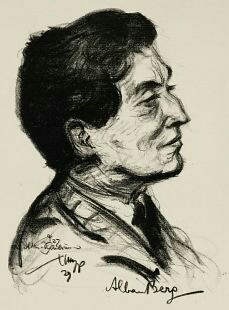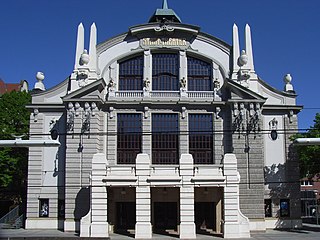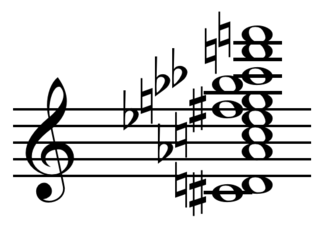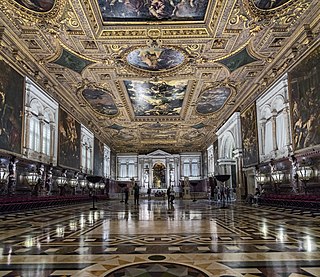Related Research Articles

The Second Viennese School was the group of composers that comprised Arnold Schoenberg and his pupils, particularly Alban Berg and Anton Webern, and close associates in early 20th-century Vienna. Their music was initially characterized by late-Romantic expanded tonality and later, a totally chromatic expressionism without a firm tonal centre, often referred to as atonality; and later still, Schoenberg's serial twelve-tone technique. Adorno said that the twelve-tone method, when it had evolved into maturity, was a "veritable message in a bottle", addressed to an unknown and uncertain future. Though this common development took place, it neither followed a common time-line nor a cooperative path. Likewise, it was not a direct result of Schoenberg's teaching—which, as his various published textbooks demonstrate, was highly traditional and conservative. Schoenberg's textbooks also reveal that the Second Viennese School spawned not from the development of his serial method, but rather from the influence of his creative example.

Alban Berg's Violin Concerto was written in 1935. It is probably Berg's best-known and most frequently performed piece. In it, Berg sought to reconcile diatonicism and dodecaphony. The work was commissioned by Louis Krasner, and dedicated by Berg to "the memory of an angel". It was the last work he completed. Krasner performed the solo part in the premiere at the Palau de la Música Catalana, Barcelona, in April 1936, four months after the composer's death.

Ernst Heinrich Krenek was an Austrian, later American, composer. He explored atonality and other modern styles and wrote a number of books, including Music Here and Now (1939), a study of Johannes Ockeghem (1953), and Horizons Circled: Reflections on my Music (1974). Krenek wrote two pieces using the pseudonym Thornton Winsloe.

Jonny spielt auf, Op. 45, is a German-language Zeitoper with words and music by Austrian composer Ernst Krenek about a jazz violinist. He dedicated the opera to his second wife, Berta Herrmann. A performance lasts about two hours. The work typified the cultural freedom of the 'golden era' of the Weimar Republic.

Karl V. is an opera, described as a Bühnenwerk mit Musik by Ernst Krenek, his opus 73. The German libretto is by the composer. His student Virginia Seay collaborated with him on the English translation of the libretto.
Orpheus und Eurydike is an opera by Ernst Krenek. The German text is based on a play by Oskar Kokoschka. Kokoschka began writing his play during his convalescence and it premiered in 1921, one year before Rilke's Sonnets to Orpheus appeared. In 1923 he let it be known that he was looking for a composer to write incidental music. Kokoschka's expressionist, psychological treatment of the Orpheus myth, marked by his passion for Alma Mahler, appealed to Krenek so he approached Kokoschka.

Schwergewicht, oder Die Ehre der Nation is a burleske Operette with text and music by Ernst Krenek, his Op. 55 and the third of his 1928 one-acters. This satirical skit was provoked by the German ambassador's comment that sports heroes – and not artists – were the true ambassadors of nations, and the title character Ochsenschwanz ("oxtail") is a reference to the boxer Max Schmeling.
Der Diktator is a tragic opera in one act with words and music by Ernst Krenek, his Op. 49 and the first of three one-acters which premiered on 6 May 1928 at the Hessisches Staatstheater Wiesbaden as part of the Festspiele Wiesbaden. The score is inscribed with the date of completion, 28 August 1926.
Leben des Orest is a grand opera in five acts with words and music both by Ernst Krenek. It is his Op. 60 and the first of his own libretti with an antique setting. The score is inscribed with the dates of composition, 8 August 1928 – 13 May 1929, and includes indications of recommended cuts made for the first production. It premiered at the Neues Theater in Leipzig on 19 January 1930, and opened at the Kroll Opera House in Berlin in early March of the same year.
Tarquin is a chamber opera by Ernst Krenek to an English libretto by Emmet Lavery. Written in 1940, it is Krenek's only unpublished opera, though a premiere in German translation took place in 1950 in Cologne.
What Price Confidence? is a chamber opera in nine scenes with music and libretto by Ernst Krenek, his Op. 111. This "little drawing room comedy" is set in London at the turn of the 20th century, and features a protagonist not unlike Max in Jonny spielt auf, as the author points out in a preface; it owes something to Melville as well, as do his next two operas.
Cefalo e Procri is a chamber opera in three scenes and a prologue by Ernst Krenek, his Op. 77, begun in 1933 and finished on 3 August 1934. The Italian libretto by Rinaldo Küfferle was commissioned by Universal Edition for the third Venice Festival. The half-hour work was revived at the Gran Teatro La Fenice in Venice in October 2017 as part of a short double-bill with a setting of the 'Lamento di Procri' by Silvia Colasanti, conducted by Tito Ceccherini.

The Bielefeld Opera is the venue of Städtische Bühnen Bielefeld in Bielefeld, Germany. It is a Dreisparten Haus, offering plays, music, and ballet. The main performance venue is the Stadttheater am Niederwall, built in 1904 and extensively renovated from 2004 to 2006. It is the largest theater in East Westphalia, offering 500 performances annually. It is under the direction of Michael Heicks; its resident orchestra is the 72-member Bielefeld Philharmonic Orchestra that also performs symphonic concerts at the Rudolf-Oetker-Halle.

In music, the 'northern lights' chord is an eleven-note chord from Ernst Krenek's Cantata for Wartime (1943), that represents the Northern Lights. Krenek's student Robert Erickson cited the chord as an example of a texture arranged so as to "closely approach the single-object status of fused-ensemble timbres, for example, the beautiful 'northern lights'...chord, in a very interesting distribution of pitches, produces a fused sound supported by a suspended cymbal roll". "The 'northern lights' sounds, so icy and impersonal and menacing, are a brilliant orchestral invention."

Gladys Mercedes Nordenstrom was an American composer.

Threni: id est Lamentationes Jeremiae Prophetae, usually referred to simply as Threni, is a musical setting by Igor Stravinsky of verses from the Book of Lamentations in the Latin of the Vulgate, for solo singers, chorus and orchestra. It is Stravinsky's first and longest completely dodecaphonic work, but is not often performed. It has been called "austere" but also a "culminating point" in his career, "important both spiritually and stylistically" and "the most ambitious and structurally the most complex" of all his religious compositions, and even "among Stravinsky's greatest works".
Sardakai, Op. 206, is a 1969 comic opera in two acts by Ernst Krenek which premiered in Hamburg in 1970. The "lightweight, fluffy farce", as Krenek described it, dealt with a Così fan tutte inspired scenario on the fictional South Seas island of Migo Migo. Krenek's libretto was intended to poke fun at both left and right wing "sacred cows". The premiere was a catastrophe, attributed by some contemporary and subsequent commentators to the Hamburg Opera director's decision to commission Krenek, who was living in California, to write his own libretto which proved to be out of touch with both the prevailing mood in Germany, and the situation at the Hamburg Opera.
Das geheime Königreich is an opera in one act with words and music by Ernst Krenek, his Op. 50 and the second of three one-acters which premiered on 6 May 1928 at the Hessisches Staatstheater Wiesbaden as part of the Mai-Festwoche Wiesbaden. It is subtitled Märchenoper in 1 Akt and has been called a satirical fairy-tale opera.
Virginia Claire Seay Ploeser was an American composer and musicologist who studied and collaborated with composer Ernst Krenek. She published her works under the name Virginia Seay.
References
Notes
- ↑ author's forward in Prosa Dramen Verse (1965)
- ↑ workpage at /datenbank.krenek.at
Sources
- Stewart, John L., Ernst Krenek: The Man and His Music. University of California Press, 1991 ISBN 0-520-07014-3 ISBN 0-520-07014-3